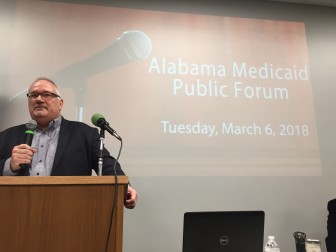Make Medicaid Recipients Work? Speakers at Public Hearing Say No
Governor Kay Ivey and other state leaders want Alabama to join a handful of states that require some Medicaid recipients to work or go to school. They say that would save money, cut unemployment, and improve health as people switch to private insurance. The proposal affects only able-bodied parents or caregivers of children under 19 who qualify for Medicaid because their family income is at or below 18 percent of the federal poverty level. But when the Alabama Medicaid Agency held a hearing on the plan Tuesday, the crowd strongly disagreed with it.
A dozen people at the Hoover Public Library took the podium and every speaker criticized the proposed Medicaid changes. Pediatric neuropsychologist Joe Ackerson wanted the crowd of more than 50 to know where he was coming from.
“I am not a Democrat,” he said. “I am not a Republican. I’m a scientist, and I’m a doctor. I’m here to talk on behalf of my patients and people with disabilities that depend on Medicaid for their very survival.”
He talked about low-income patients – and the people caring for them – who can’t work, adding, “As a decent society, we pay taxes in order to help those people that need extra help to get by. It’s the Judeo-Christian thing to do. It is the proper, right, moral, ethical thing for people to do.”
Lianne Webb says she’s suffered from health problems, and she worries enforcing the requirement wouldn’t save money.
“Doing all that work, all those people … I just don’t see it ever becoming budget-neutral,” says Webb.
This was the last of two public hearings in the state, but people can still comment by mail and through the Alabama Medicaid Agency website until April 2. After that, there will be a national comment period. All comments become part of Alabama’s application for a federal waiver to try the proposed changes for five years.
Alabama has more than a million Medicaid enrollees, and more than half of them are children. The Alabama Medicaid Agency says the proposed requirement would affect up to 75,000 people.
You can learn more about the Alabama’s proposed plan, including who would be exempt from the work requirement, here.
This global health leader praises Trump’s aid plan — and gears up to beat malaria
Bill Steiger, who served in the George H.W. Bush and first Trump administrations, reflects on the past year's changes in the U.S. role — and his new job as head of Malaria No More.
Grammys 2026: 10 takeaways from a historic, chaotic night
The Grammy Awards were full of milestone wins, chaotic performances and viral moments, as well as speeches that frequently addressed this moment in American history.
Hemp and marijuana are the same species. So why all the different laws?
Farmers in the U.S. have grown cannabis since the 1600s — but policymakers are still figuring out how to regulate two famous types of Cannabis sativa. A historian calls the plant "incredibly cryptic."
Too old to compete? This 87-year-old triathlete has tips for staying in the game
Despite issues with her heart, this octogenarian still competes in triathlons. She's proof that preventive medicine paired with smart lifestyle choices help seniors stay active longer.
The Education Department’s efforts to fire staff cost over $28 million, watchdog says
A new report from the U.S. Government Accountability Office calculates the cost of efforts to fire civil rights staff, and questions the department's ability to enforce federal civil rights laws.
Refugees relive the trauma they fled as ICE targets them in Minnesota
The Trump administration says it's reviewing thousands of cases to look for potential fraud. A judge ordered a temporary pause, saying refugees cannot be arrested "without warrants or cause."






